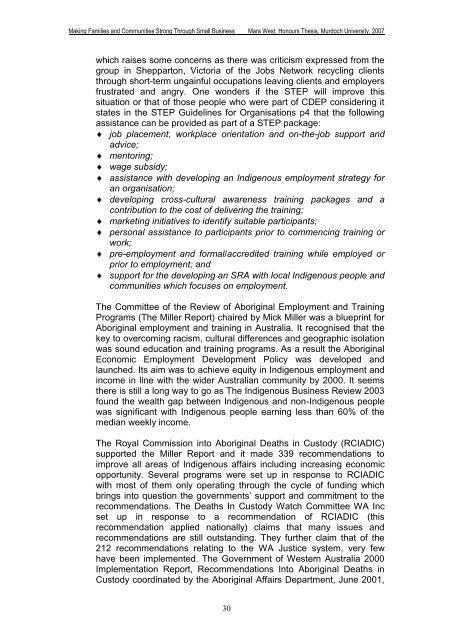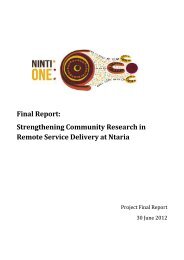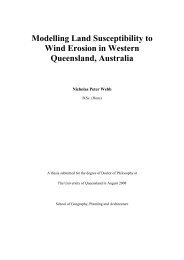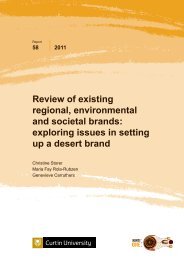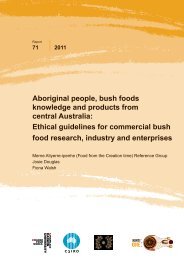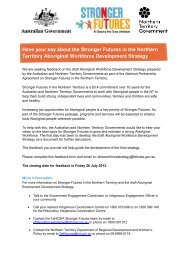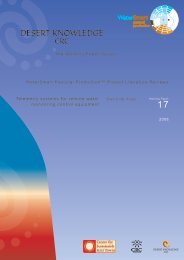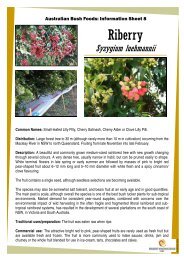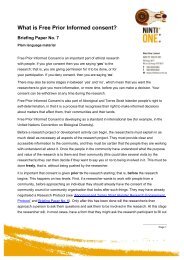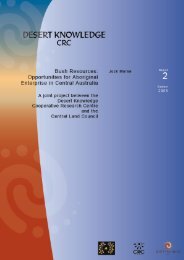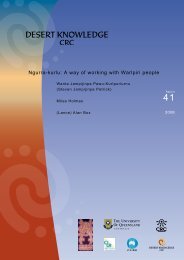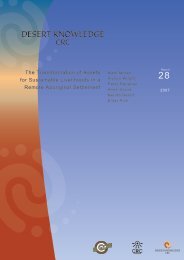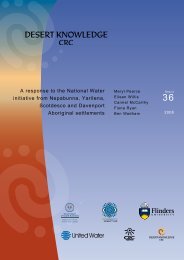MAKING FAMILIES AND COMMUNITIES STRONG THOUGH SMALL BUSINESS
making families and communities strong though small ... - Ninti One
making families and communities strong though small ... - Ninti One
- No tags were found...
Create successful ePaper yourself
Turn your PDF publications into a flip-book with our unique Google optimized e-Paper software.
Making Families and Communities Strong Through Small Business Mara West, Honours Thesis, Murdoch University, 2007which raises some concerns as there was criticism expressed from thegroup in Shepparton, Victoria of the Jobs Network recycling clientsthrough short-term ungainful occupations leaving clients and employersfrustrated and angry. One wonders if the STEP will improve thissituation or that of those people who were part of CDEP considering itstates in the STEP Guidelines for Organisations p4 that the followingassistance can be provided as part of a STEP package:job placement, workplace orientation and on-the-job support andadvice;mentoring;wage subsidy;assistance with developing an Indigenous employment strategy foran organisation;developing cross-cultural awareness training packages and acontribution to the cost of delivering the training;marketing initiatives to identify suitable participants;personal assistance to participants prior to commencing training orwork;pre-employment and formal/accredited training while employed orprior to employment; andsupport for the developing an SRA with local Indigenous people andcommunities which focuses on employment.The Committee of the Review of Aboriginal Employment and TrainingPrograms (The Miller Report) chaired by Mick Miller was a blueprint forAboriginal employment and training in Australia. It recognised that thekey to overcoming racism, cultural differences and geographic isolationwas sound education and training programs. As a result the AboriginalEconomic Employment Development Policy was developed andlaunched. Its aim was to achieve equity in Indigenous employment andincome in line with the wider Australian community by 2000. It seemsthere is still a long way to go as The Indigenous Business Review 2003found the wealth gap between Indigenous and non-Indigenous peoplewas significant with Indigenous people earning less than 60% of themedian weekly income.The Royal Commission into Aboriginal Deaths in Custody (RCIADIC)supported the Miller Report and it made 339 recommendations toimprove all areas of Indigenous affairs including increasing economicopportunity. Several programs were set up in response to RCIADICwith most of them only operating through the cycle of funding whichbrings into question the governments’ support and commitment to therecommendations. The Deaths In Custody Watch Committee WA Incset up in response to a recommendation of RCIADIC (thisrecommendation applied nationally) claims that many issues andrecommendations are still outstanding. They further claim that of the212 recommendations relating to the WA Justice system, very fewhave been implemented. The Government of Western Australia 2000Implementation Report, Recommendations Into Aboriginal Deaths inCustody coordinated by the Aboriginal Affairs Department, June 2001,30


